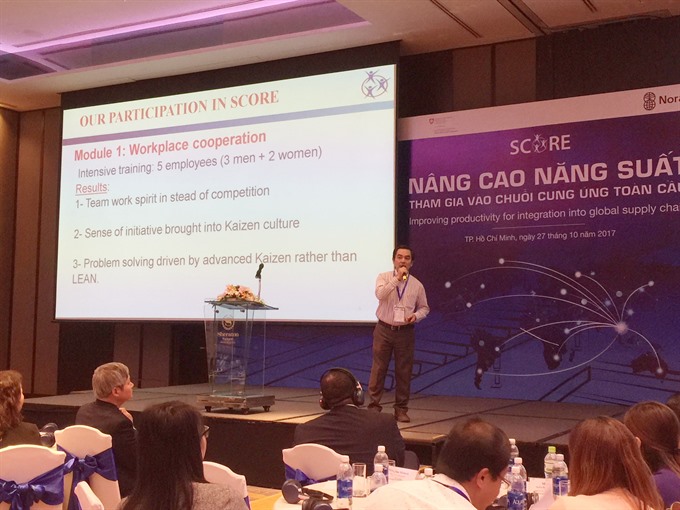 Economy
Economy

The Sustaining Competitive and Responsible Enterprises (SCORE) programme has benefited participating factories by helping cut costs, improve workplace co-operation, increase productivity and reduce employee turnover rate, a forum heard in HCM City yesterday.
 |
| Lê Văn Minh of Tường Văn Co.Ltd said his firm participated in modules 1 (workplace co-operation), 2 (quality management) and 5 (safety and healthy at work) of the SCORE programme, and he is happy with the results. — VNS Photo |
HCM CITY — The Sustaining Competitive and Responsible Enterprises (SCORE) programme has benefited participating factories by helping cut costs, improve workplace co-operation, increase productivity and reduce employee turnover rate, a forum heard in HCM City yesterday.
SCORE is a global ILO-backed technical co-operation programme that is going in many countries like China, Indonesia, Việt Nam, India, Colombia, and Malaysia.
Its goals are to help small and medium-sized enterprises improve productivity and working conditions, enhancing their long-term competitiveness.
Võ Tân Thành, director of the Việt Nam Chamber of Commerce and Industry’s HCM City branch, said with financial support from Norway and Switzerland, since 2011 VCCI-HCM City and SCORE have been organising training and consultancy programmes for SMEs in the wood processing sector in Bình Dương, Bình Định, Đồng Nai, Long An, and HCM City.
Recently the programme has expanded to support the garment and supporting industries in HCM City and Đồng Nai Province.
Chang Hee Lee, ILO director for Vietnam, said since 2011 SCORE has focused on initiating and supporting an improvement in workshop layout and operations, quality management, cleaner production and safe and healthy working environment through nurturing, facilitating and embedding worker-management dialogue processes at the workplace.
“Altogether 146 companies have participated so far, 1,150 staff and workers have been trained and 91 per cent of trained companies reported significant cost saving.”
Above all, the project has been “instrumental in creating and spreading business culture innovation for better performance of SMEs,” he told the forum titled “Improving productivity for integration into the global value chains.”
As the CEO of one of the wood processing companies participating in the programme since 2014, Lê Văn Minh of Tường Văn Co.Ltd said it participated in modules 1 (workplace co-operation), 2 (quality management) and 5 (safety and healthy at work) of the programme, and he is happy with the results.
The programme has helped his company with “successful arrangement of the chair production line with reduction of takt time from 14 to nine days.”
In addition, through modules 1 and 2, the company is able to save VNĐ840 million a year on average, he said.
“The biggest value from the project is the Kaizen culture and co-operative spirit at the workplace.”
Minh Mẫn Printing Co., Ltd is also happy with the results of the programme after participating for three months.
Trương Thu Trâm, its deputy director, said the programme had created a spirit of self-consciousness and pro-activeness in all employees in implementing 5S-Kaizen.
“The working environment is always clean and safe, bringing high efficiency in production.”
Lee said SMEs account for 97 per cent of enterprises in Việt Nam. Unlike State-owned enterprises and foreign firms, they face numerous challenges in terms of access to bank loans, markets, advanced technologies and productivity-enhancing techniques.
“Often they are outside the global supply chains and even when they are inside, they are at the bottom layer of the global production chains, struggling to survive with low productivity.
“Creating enabling environment for sustainable development of SMEs is a key to the sustainable development of Việt Nam.”
Organised by VCCI-HCM City and ILO, the forum wrapped up SCORE phase II, and also discussed opportunities and challenges for SMEs when participating in global value chains and inquiries by international buyers, and introduced a strategic framework to support enterprises in the programme’s new phase.
Phases I and II have done an outstanding job of demonstrating that SMEs can improve their productivity and working conditions through labour-management co-operation.
Building on the success, SCORE’s phase III aims at upscaling its impacts, firstly by embedding SCORE training in national training programmes with support from the SCORE National Centre hosted by the VCCI and secondly by leading multinational buyers to support SCORE training in their supply chains. — VNS




